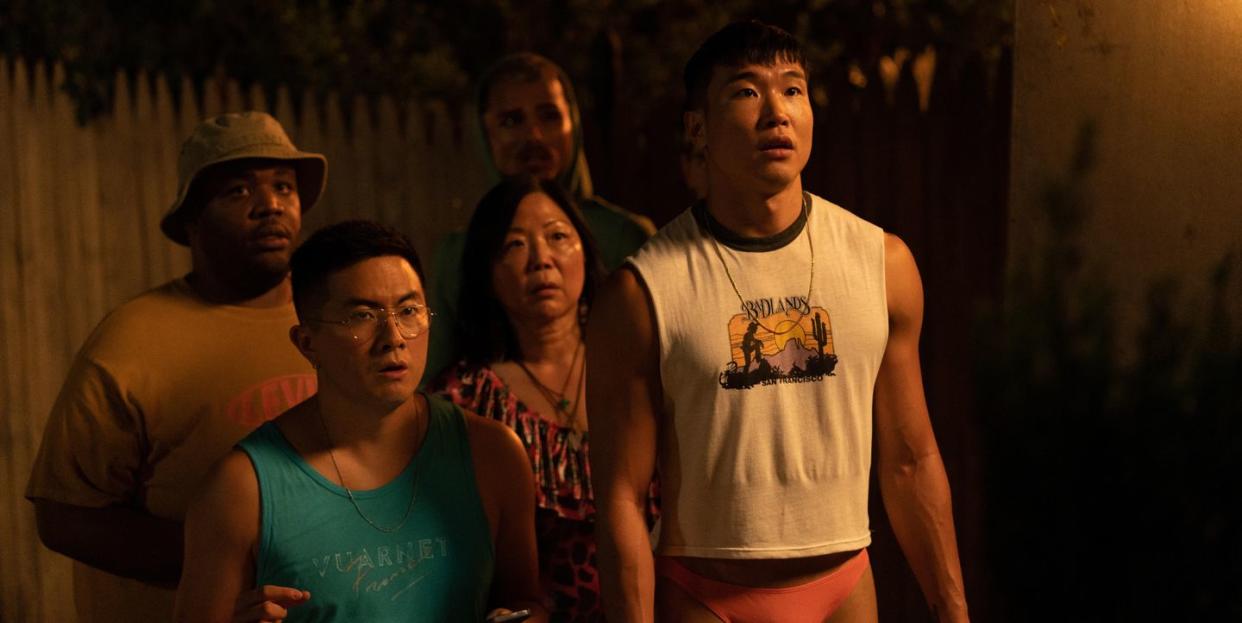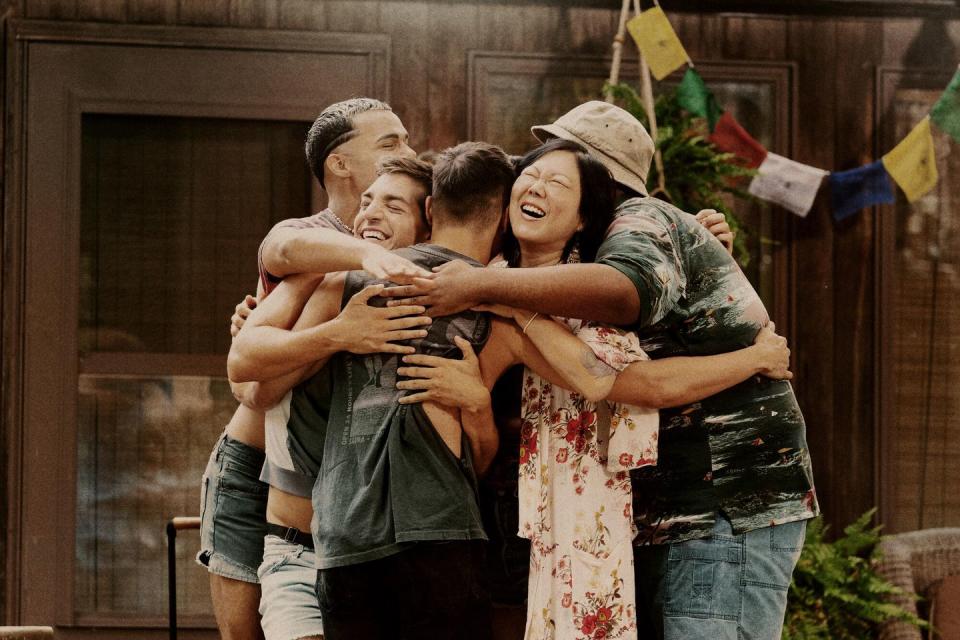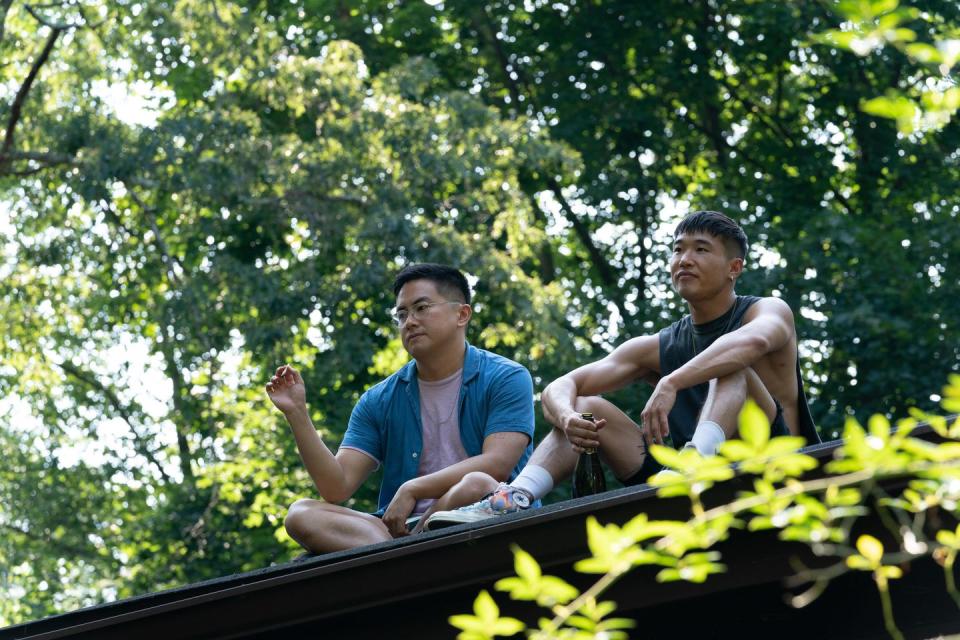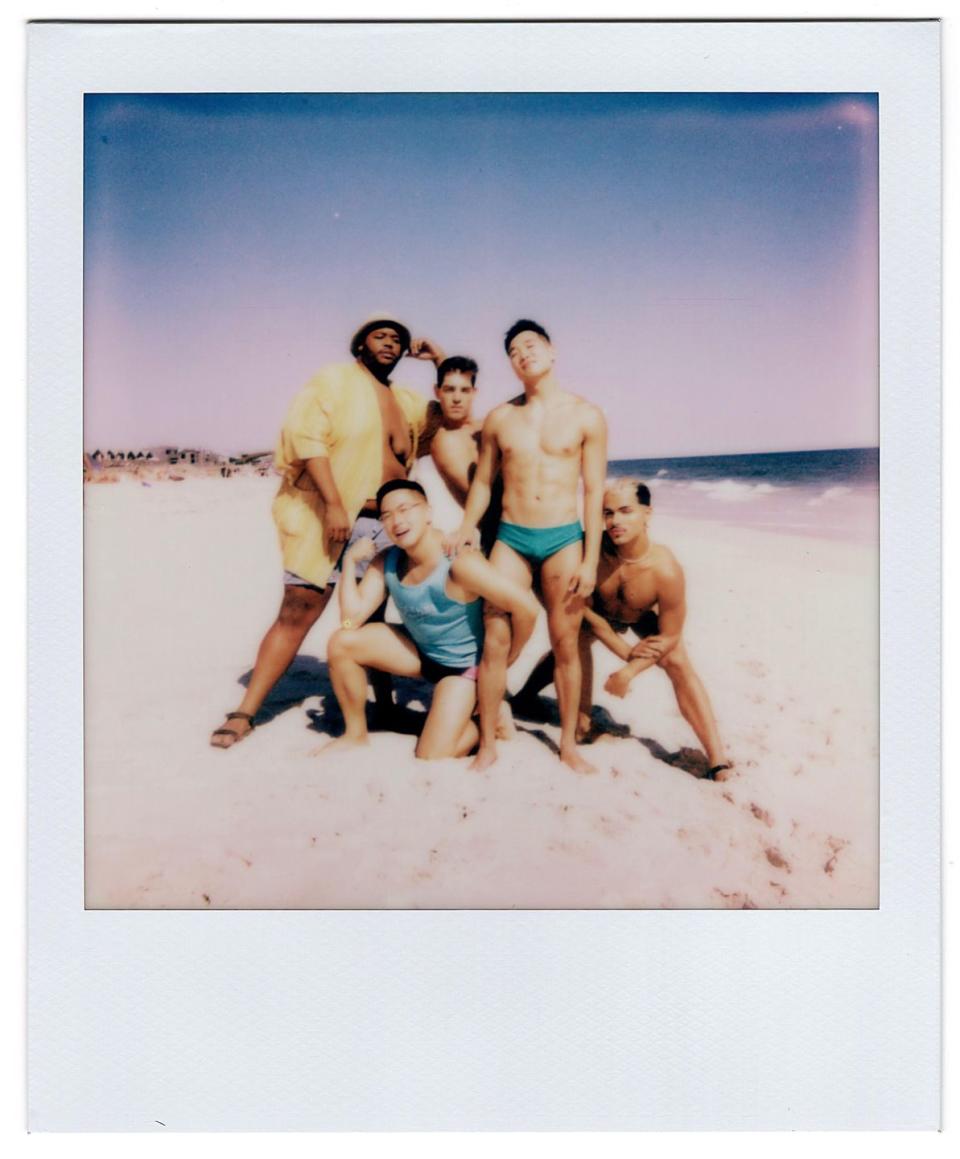'Fire Island' Wants You to Rethink the Rom-Com

- Oops!Something went wrong.Please try again later.
- Oops!Something went wrong.Please try again later.
- Oops!Something went wrong.Please try again later.
"Hearst Magazines and Yahoo may earn commission or revenue on some items through the links below."
When Joel Kim Booster took his first ferry to Fire Island, the 32-mile barrier island that lies off the south shore of New York’s Long Island, the rising comedian brought a copy of Jane Austen’s Pride and Prejudice with him to read on the beach.
As he reexamined the storied courtship of Elizabeth Bennet and Fitzwilliam Darcy, Booster discovered that he could map Austen’s incisive observations about class and status in 19th-century English society onto his own experiences as a gay Asian man in the 21st century, especially in a place like Fire Island, which can be, as he puts it, “oppressively white and inherently classist.” Over the years, Booster joked with friends—including Saturday Night Live’s Bowen Yang, who accompanied him on that fateful first trip to the Pines—that he would one day create a gay adaptation of the beloved Regency-era romance novel. But now, that pipe dream has become a reality with queer Asian creatives on both sides of the camera.
Written by Booster and directed by Andrew Ahn, Fire Island follows two best friends, Noah (Booster in the Lizzie Bennet role) and Howie (Yang), who travel to the picturesque enclave every summer with their friends—Luke (Matt Rogers), Keegan (Tomás Matos) and Max (Torian Miller). But after discovering that their friend Erin (Margaret Cho) is planning to sell the place they consider a second home, the friends become determined to make the most of what could be their last summer together on the island. While Howie begins to fall for a charming doctor named Charlie (James Scully), Noah finds himself both repelled and attracted to Charlie’s best friend, Will (Conrad Ricamora in the Mr. Darcy role), a handsome lawyer from Los Angeles.
In a joint interview with BAZAAR.com, Booster, Yang, and Cho speak candidly about how their own personal experiences informed the making of Fire Island, and how the film explores the racism and classism that can arise in a queer mecca while also capturing the unapologetic joy of the LGBTQ+ community.
Bowen, a lot of this script was mined from your own personal conversations with Joel about Fire Island, and you were forced to relive some of the experiences that you had moved past in your own life. What were some of your initial impressions of Joel’s screenplay, and how did they ultimately compare to the final product?
Bowen Yang: I didn’t realize how thorny the work would be, because [in] those early drafts of the script, the characters were named Joel and Bowen. So it wasn’t until a few months before we started shooting that Joel and I had discussed what the options were, if we wanted to go with different names, and I remember being on the subway and sending Joel a list of names that could be a gay Asian millennial’s first name. And I was like, “Wilson?” And then, he was like, “No, that’s Conrad’s character.” I was like, “Oh, what about Howie?” And then, I think there was just something that felt right about that, and I think he had already picked out Noah at that point and loved the biblical connection, I guess.
But I didn’t realize how I needed to re-gauge the distance between how much this was mined from [my] personal life and how much I actually did not completely identify with Howie’s journey anymore, but that was all a big lesson. I think in terms of the gift that Joel gave, in terms of giving me this opportunity to show this different side of my performance or what I’m able to do, I think that was just a really nice boon by the end—it was a benefit of the whole thing.
Margaret, Joel has said that he can draw a direct line from All-American Girl to Fire Island in terms of your influence as a queer Asian comedian. How did this project first come to you?
Margaret Cho: Well, when it came out on social media that Joel had written this script, that Bowen and Joel were starring, and that Andrew was gonna direct, and it was called Fire Island, I reached out and I was like, “I’m in this movie. I don’t know if you know … I’m not sure if your reps told you, but I’m actually in this!?” And I bulldozed my way into [this] movie. [Laughs.]
And we talked about it, and the role of Erin, which was written for a man initially, was something that we could move and Joel worked with it, and it was so fun. Just knowing that these guys were making a movie about Fire Island with Andrew was enough for me to say, “I’m in it!” I birthed this, even though I know that they didn’t have me in the script before, but now I am, so it was a very exciting thing. It was really a moment of recognition: “Oh, this is my project too.”
Joel Kim Booster: Yeah, it really, really was cosmic, because I just remember turning to Andrew when they told us that Margaret’s reps had reached out, and we just looked at each other and I was like, “Oh, my God, this character is Margaret Cho.” It was originally written to be an older gay man [named Aaron], but I barely had to change it for Margaret. [Laughs.]
She met with Andrew and shared a lot of her own Fire Island stories, and that was really one of the beautiful parts about having Margaret there, because Margaret has such a history with the island, and that story [Erin] tells at dinner is taken directly from Margaret’s life. A version of that is the story she told Andrew in her original talk with him about the movie, so I think it adds a dimension to the movie that I didn’t even know I needed, and now her presence just seems so vital that I can’t believe there was ever a version of this without her in it.

Why do you think a romantic comedy is the right genre to tackle the social, cultural, and political divides that are drawn within queer communities?
JKB: I think that queer dating is different. There are so many more dimensions to the ways in which we have to interact with each other on a romantic level, and I think that so often in gay rom-coms, it’s just like, “Oh, [it’s like] When Harry Met Sally, but let’s make Sally a man instead, and then play that out, and then we try to just map onto a straight dating experience.” But especially as Asian men in the queer community, there are just so many more layers to what we have to go through to find love, and then what happens when we do find it. There’s so many more barriers and hurdles to keeping it, to feeling healthy within that ecosystem.
For me, I really love rom-coms, and I wanted to queer it—literally queer the rom-com structure. And obviously, there’s still so many homages and, you might say, rom-com clichés in the movie, but I hope that they’re turned a little bit on their head just by the nature of the queerness of the characters.
BY: I think, thematically, doing press for this movie, we’ve all understood that the coping mechanism which we filter all of our pain through is humor, and that probably lends itself to the genre too. It was just a perfect container in order to have all of these different comments and observations that Joel makes and that Jane Austen has made.

For so long, queer people have had to struggle to find their resilience and self-reliance—and that, in turn, seems to have created a media landscape that skews toward darker and more traumatic narratives. Why do you think it is so important to tell stories that capture the unapologetic joy of these communities?
BY: I feel like that was just something that was refreshing in terms of the broader landscape of things that have mined trauma—probably not gratuitously, but to an extent that it shaped an expectation for people to consume queer media.
MC: It’s like Gay Pride and Gay Prejudice—this idea that gay pride is a big part of who we’re supposed to be, but gay prejudice is the real world that we live in. And [when you’re] gay, sometimes you think you’re above other kinds of bias. But in truth, we’re steeped in it. And the film recognizes that, but in such a gentle and light and funny way that nobody who is guilty of these things in the film and in the real world is gonna take offense, because it’s just a detail in the same way that a lot of the sexuality and these drug-fueled sex parties [are presented]. You hear “drug-fueled sex parties,” [and] there’s always a sort of moral lesson that can be learned in film when you have a drug-fueled sex party. But here, it’s just a detail of the landscape, which is so real and so vital to communicating who we are.
JKB: I think, especially now, with what’s going on and the way parts of this country have backslid on queer issues, it was especially paramount for me to show the joy that comes out of resilience; what happens when we make it on the other side of that hump of trauma and pain and discrimination is joy, and I think it’s self-generated when you find your tribe.
Queering Pride and Prejudice was not just about making it all about gay men, but it was shifting the focus from the love stories to the chosen family of the story. I think finding the joy inherent in finding those people in your life and gathering them around you was so important for me to depict and the whole reason I wrote the movie.
In a recent interview, your costar Zane Phillips, who plays Dex, said “there is still a fundamental fear” when it comes to depicting a romantic relationship between two men, in the sense that some people want them to be desexualized—and that’s one of the many subversive themes of Fire Island. Why do you think there continues to be a sense of discomfort when it comes to male intimacy, even in queer spaces that might be physically removed from outside societal expectations?
BY: I think it’s a fear of sodomy, honestly. [Cho laughs.] I think if you see two men hugging and kissing each other, you think, “Well, one of them’s gonna stick something in the other’s ass.” People get squeamish about it, still, and it’s wild.
JKB: It’s not wrong! I’ve had club owners tell me not to talk about dating, because if I talk about my dating life onstage, then that will immediately make people think about the way I have sex, and that will immediately turn off the audience.
There is this weird fear—or not even fear, but just, in our society, an ingrained disgust of the way in which we have sex, or a lot of us have sex anyways. There are a lot of gay men who don’t engage in that, but it is a big part of that, and I think it’s connected to toxic masculinity too. A big part of it is that a lot of people will say, “We don’t care that you’re gay; we just don’t want you to be a f—.” And this movie is about f—. It’s about people who can’t hide and who refuse to hide the parts of themselves that are inconvenient for mainstream society.
BY: That’s what’s radical about what you guys were talking about with the drug-filled sex party being the background noise. There’s anal sex that is low frequency, humming in the background for a couple of frames. I’ve never seen that in a studio film [before].
Fire Island, while tackling issues of race and class, still finishes with the sweeping ending of a classic rom-com. What do you remember from the process of shooting the water taxi and dock scene toward the end of the film?
JKB: The dock scene was very dramatic, because we almost weren’t able to shoot on the dock, because the tides were so intense on the day that we were originally supposed to shoot, and I remember producers coming up to me and telling me, like, “You need to come up with an alternative location for this scene with Conrad.” And I was at my breaking point at this point in the process, and I was like, “There is no alternative. There isn’t! Shut down the movie, because if we can’t shoot it here, then it’s not gonna happen.”
I remember on the day when we were able to do that, it was such a relief and it actually pushed the shoot day for that scene closer to the end of our filming. So when everyone comes back and starts dancing to “Last Dance,” it really did feel like this wonderful, cathartic moment at the end of our shoot. So it just felt like we weren’t even acting, we were just celebrating, and that’s probably what I’ll always remember from that as well—and I got to kiss Conrad Ricamora! What a dream.
BY: [The water taxi scene] was very fun and also was sobering on a production level, because they had to reset the taxi every single time. Joel, Margaret, James, Conrad, Matt, Tomás, Torian—everybody had to be on that boat. You guys were on that boat for, what, 10 hours?
JKB: 10 hours, yeah, truly.
BY: Just being shuttled back and forth on a small rocky boat in semi-choppy waters. I was able to stand on land the whole time to work myself up until I was in tears, but I didn’t have to physically be lurched around, and that was what I remember most. But I also just remember just feeling like I was swept off my feet—not only by James as a love interest, but also by the whole cast watching. I think not every airport chase scene in a rom-com has the rest of the cast there cheering the whole thing on, and I think there’s something so magical about that scheme, that setup, that layout.

There’s something that sounds almost counterintuitive about how the more specific you are about who you are and where you come from, the more universal it becomes for audiences. What do you think the overwhelmingly positive response to this film says about the demand for queer stories that feel authentic and highly specific to people’s own experiences?
JKB: I hope [this movie] opens doors; I hope it emboldens people to tell their own stories and tell them their way. We didn’t water anything down; we weren’t afraid to make references to PrEP without explaining what PrEP was. It was a second thought to us, and I hope that it’s a lesson, that we’re sort of a test case for making these specific references and not watering things down for mainstream audiences. We respected our audience enough to figure that they would get it without us holding their hand through every story beat and every reference.
And so, I hope there are a million Fire Island clones—I hope that they’re all better than Fire Island. I hope that they continue to tell different and more diverse stories, and that it really gives people the fire to tell their very specific stories.
MC: I just think that the movie is so beautifully acted, beautifully written, beautifully shot. It’s really a pleasurable watch just for a romantic comedy, which is a staple of American cinema, and I think when we look to beautiful, summer romance movies, we’ll remember this one for a long time.
BY: I agree, and I think one of the most touching aspects of this film is the respect and care that Joel and Andrew had in terms of building this conduit to the prior generations. The movie ends on this beautiful drone shot of the entire island, or the Pines at least, and it’s just that perspective of seeing it all holistically is so moving to me.
Matt and I were talking about this last night to Andrew in tears being like, “You see that shot and that song play, and you can kind of feel the phantoms of the people who’ve been there over the decades.” It’s just so arrestingly beautiful to think about, and I think it’s a perfect last image to end on for the movie.
What other literary classic do you think should be reimagined through a queer lens?
JKB: I think my next project is gonna be a gay Of Mice and Men. [Cho and Yang laugh.] We’ll see who I cast as my Lennie. I think I’m done with adaptations for a second, but I hope to return to it. I actually think that the next Jane Austen—the most interesting would be Mansfield Park, because that is, I think, one of her most problematic works. Not problematic in a modern-day way, but just narratively, it’s a difficult piece, and I think it would be an interesting challenge to tackle and make gay.
MC: The Bible! Come on, he had 12 boyfriends! He was polyamorous! [Booster and Yang laugh hysterically.] Early polyamorous relationships should be examined.
JKB: Oh, my God.
BY: Oh, my God, I can’t beat that. I can’t beat the Bible. It’s the Bible!
MC: Jason and the Argo-bottoms! [Yang laughs.] Or Argo-tops! Argo-tops would be better.
BY: I would love to see an Odyssey reimagining. Just someone who’s walking from one end of the country to another.
MC: Fire Island to Palm Springs!
This interview has been edited and condensed for length and clarity.
Fire Island is now streaming on Hulu.
You Might Also Like

